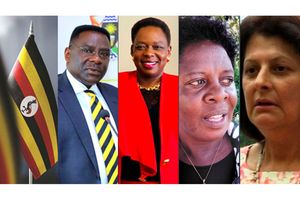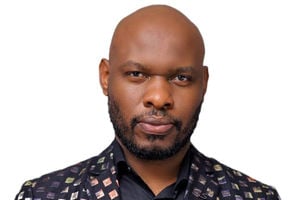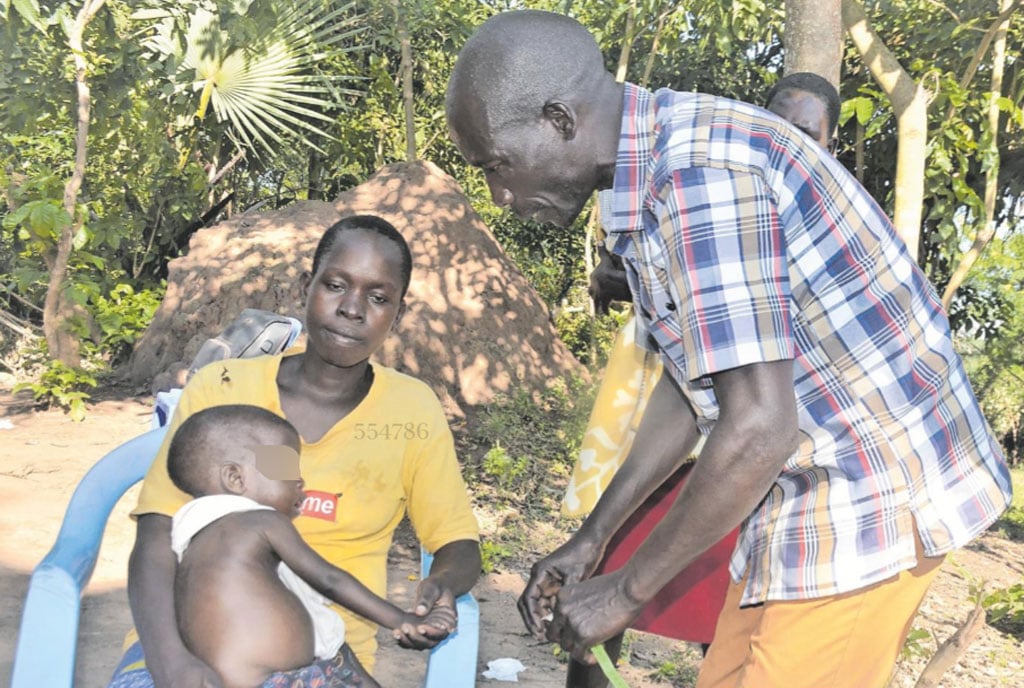
Uganda High Commission to South Africa Paul Amoru, Ministry of Foreign Affairs Permanent Secretary Vincent Bagiire and accounting officer in Pretoria Dennis Kalikola at the function. Photo | Courtesy of the Ministry of Foreign Affairs
The first five-day introspection meeting of Uganda’s ambassadors abroad closed last Friday at the Civil Service College in Jinja with a large turn up.
There was also a conspicuous no-show by Joy Ruth Acheng who was kicked out days earlier as Uganda’s High Commissioner in Ottawa, Canada.
Also absent with permission were Uganda’s High Commissioner to Abuja, Nigeria, Mr Nelson Ocheger, and the High Commissioner to Canberra, Australia, Dorothy Hyuha who was in the Pacific island nation of Tonga to receive Prime Minister Robinah Nabbanja.
Uganda’s Ambassador to Washington DC Robie Kakonge drew a $5,932 (Shs21.9m) air ticket to attend the conference, the first since Covid-19 upended life in 2020. She attended the opening day and returned to Washington for the Uganda North American Convention (UNAA)-related activities.
Others who left the conference flabbergasted in their presentations were Ambassador Marcel Tibaleka, Uganda’s Permanent Representative to the UN, Geneva, Switzerland; and Maj Gen (rtd) Matayo Kyaligonza, Uganda’s ambassador to Burundi.
With majority of the ambassadors appointed on the basis of being loyal cadres, National Resistance Movement (NRM) political rejects, or political appointees, and usually lacking in both dexterity and sophistication, the ambassadors’ conference were conceived as an annual ritual to bring all of them in one room to, among others, facilitate peer-to-peer knowledge sharing, take stock of challenges in the high octane geo-politicised world, appraise them on government priorities and policies, as well as agree on the effective and efficient approaches for promotion of economic and commercial diplomacy.
However, going by the Ministry of Foreign Affairs own internal documents, “this ritualistic approach was found unsustainable because many participants did not realise and appreciate the value in attending and participating in the deliberations thereof.”
Carrot and stick
This time around the ministry’s human resource department conceived the idea of rewarding excellent performers and sanctioning underperformers following intensive scrutiny.
To get started, the ministry sent out a template for submission of key outputs by all the country’s 39 missions abroad.
The innovation, however, drew mixed reactions immediately. Some ambassadors, according to inside accounts, felt the idea was rushed while others with expanded mandate, say multilateral missions, described as “unfair” being lumped with small missions—embassies and consulates.
During the conference last week, Uganda’s Consulate in Mombasa, Kenya emerged the best performing mission, followed by the embassy in Abu Dhabi, United Arab Emirates (UAE), while the Geneva mission ranked third.
The Mombasa Consulate led by Ambassador Paul Mukumbya, according to a statement by the ministry’s public diplomacy unit, was distinguished for “leveraging of their location on the East African Coast to boost tourism numbers between Uganda and Kenya, and using the events as platforms for businesses to network.”
Uganda High Commission in Pretoria, South Africa took home the ‘Missions Innovative Award’ for their “adept utilisation of diaspora networks to expand their commercial diplomacy footprint.”
According to the assessment report of the awards, a copy of which Sunday Monitor has seen, submissions were received from 27 missions out of 39. Of the 27, two could not be assessed “because they failed to comply with the reporting standards.
The embassies that did not submit entries included, Washington DC (USA), Algiers (Algeria), Addis Ababa (Ethiopia), Havana (Cuba), London (UK), Ottawa (Canada), Kigali (Rwanda), Khartoum (Sudan), Berlin (Germany), Tehran (Iran), Moscow (Russia), and Ankara (Turkey), which submitted past deadline.
“The committee detected an apparent lack of appreciation of the performance assessment tool. For example, outputs and targets were poorly set or not indicated at all,” the assessment report by the seven-member rewards and sanctions committee reads in part.
The quandaries
During the last decade, Economic and Commercial Diplomacy (ECD) has been at the forefront of the Ministry of Foreign Affairs' agenda, with all embassies and consulates given key performance indicators to meet, to attract massive Foreign Direct Investments (FDI) in currently, agricultural mechanisation, tourism, mineral development, and science and technology. However, the failure to match the same with funding has rendered implementation problematic.
In Uganda’s case, President Museveni’s choice of representatives to key outposts for FDI potential doesn’t help matters.
Nevertheless, analysis of presentations by ambassadors during last week’s conference reveals that some of Uganda’s embassies work under sometimes nerve-wracking circumstances with few staff and a meagre budget, which points to the government’s casualness about both Foreign Service and ECD generally.
For instance, Uganda’s embassy in Moscow—which oversees Russia, the largest country in the world and with the fourth largest GDP, Kazakhstan, Uzbekistan, Belarus, Georgia, Mongolia and Moldova—has seven staff deployed from Kampala and eight local staff, including three drivers, three household servants, a receptionist, and office assistant.
“With 89 regions, six other countries of accreditation, 141 embassies (out of which 42 are African), and several other diplomatic agencies; the Mission requires more diplomatic staff. This calls for more funding,” Moses Kizige, the head of mission, said, adding, “Russia is an already developed economy, and its GDP is increasing each day. Since the 2019 Sochi Russia-Africa Summit, the leadership in Russia has fully opened up its economy to Africa. The sooner we take advantage of this development the better.”
Uganda’s ambassador to Beijing, China, Oliver Wonekha also decried budget cuts that hamper work plans and the limited responsiveness by ministries, agencies and departments (MDAs) and private sector players on available opportunities for trade and tourism promotion such as fairs and exhibitions. She reported a significant increase in Uganda’s export volume to China.
“For instance, in 2022, the coffee export value was $5.42m (Shs20 billion) which increased to $8.36m (Shs30 billion) in 2023, and in the first four months of 2024, the export amount reached $4.54m (Shs16.7 billion), marking a 516.46 percent increase compared to the same period in 2023,” she noted.
Chequered record
Uganda’s embassy in Berlin, Germany, is also accredited to Austria, Czech Republic, Poland, Hungary, The Vatican, Slovakia, Bulgaria, Romania and Ukraine.
Despite the large area of operation, Stephen Mubiru, the head of mission, decried among others, few staff, limited resources, especially for commercial diplomacy, and non-payment of Uganda’s assessed contributions to organisations, including the International Atomic Agency (IAEA) in Vienna and the International Tribunal of the Law of the SEA (ILOS) in Hamburg. This as Uganda lags far behind in trading with Germany, the largest economy in Europe and third largest in the world.
According to Uganda’s embassy, Kampala’s main exports are coffee, tea, and spices. However, in 2021, Uganda exported products worth only $132,663 (Shs489m) in 2021; $147,474 (Shs544m) in 2022; and $212, 690 (Shs784m) in 2023.
Uganda’s major export to Romania is fish which stood at $6,548 (Shs24m) in 2021; $7,956 (Shs29m) in 2022; and $8,808 (Shs32m) in 2023.
Uganda’s Mission in Copenhagen, Denmark, also accredited to Sweden, Norway, Finland, Iceland, Estonia, Latvia, and soon Lithuania, is in urgent need of at least Shs14 billion for renovation of embassy property to improve the country’s image in the Nordics and Baltics states.
In its presentation, the embassy also decried the “limited support from stakeholder MDAs in Uganda further constrained our ability to implement critical initiatives” and the “lack of coordinated support from home has been a persistent obstacle, affecting our embassy’s capacity to realise its objectives fully.”
A tale of lack
In Addis Ababa, Ethiopia, Ambassador Rebecca Amuge also decried the limited human and financial resources to deliver on the mission’s mandate.
“The mission budget is inadequate given the multilateral nature of Addis Ababa. There is need for the provision of adequate funding to enable follow up on critical decisions made i.e. in the Africa Union (AU), Intergovernmental Authority on Development (IGAD) and other multilateral agencies,” she noted, adding to the mix the limited coordination and inadequate sharing of information between the mission and the respective government MDAs.
In Geneva, Switzerland, the mission, among others, negotiated increment of United Nations High Commissioner for Refugees (UNHCR) Uganda country budget from $161m (Shs593 billion) to $249m (Shs918 billion), lobbied for increment of recruitment of Ugandans in the UNHCR country office to 10,000 from 6,400 in 2022, and coordinating G77+China and Non Alignment Movement (NAM) activities in coordination with the mission in New York.
However, Ambassador Tibaleka decried poor staff levels at all ranks to “represent and chair technical meetings” and to offer consular services to Ugandans.
In Paris, France, Ambassador Doreen Ruth Amule reported that the mission does not own an official residence and has been renting premises for the head of mission since 1969.
In Mogadishu, Somalia, Ambassador Sam Tulya-Muhika also decried the lack of funds for ECD and for travels to attend meetings by East African Community and African Union.
There is one common factor in the activities of all the 39 missions; limited funding and staff shortages. These are routinely compounded by dogfights, lowering work morale and fracturing work relations.







